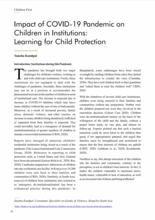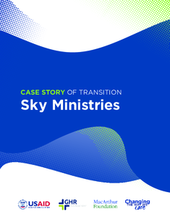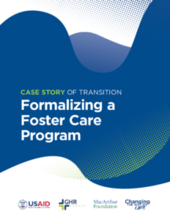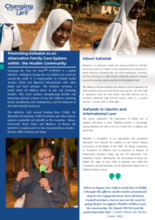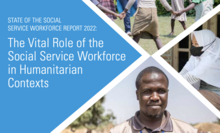Displaying 1001 - 1010 of 10391
Children First: Journal on Children's Lives is a bi-annual and peer-reviewed journal, launched by Delhi Commission for the Protection of Child Rights (DCPCR) with the aim of deepening and broadening the discourse on child rights by providing a platform to all persons who are engaged with
the rights of children in varied capacities to share their learnings, views and experiences in this context. This issue focuses on the continued impact on children in the Indian context in the second year of the pandemic and the disruptions caused in the children's lives. This is one of the articles in the latest issue.
This case story is meant to illustrate transition, the actors involved, the challenges and the success factors; recognizing that each transition is an individual process with different starting points, different dynamics and different evolutions.
The story of Identity Mission tells how a program focused on supporting vulnerable children by providing family-based care solutions alongside the local church came to be and what the challenges were to creating a mission focused on family. It is the story of one person’s own transition.
This short document describes the process of ensuring Kafaalah is considered as a family-based alternative care option within Kenya and the work to promote best practice within the model. It describes the journey of developing a framework and standard operating procedures, beginning with the launch of the Kenyan Guidelines on the Alternative Family Care of Children in 2014. Changing the Way We Care worked with many partners and shares the learning on Kafaalah through this document. Changing the Way We Care is a global initiative implemented by Catholic Relief Services, Maestral International, and other global, national and local partners working together to change the way we care for children around the world.
Drawing from a review of global reports and case studies, as well as from information sourced from Global Social Service Workforce Alliance members, this report brings to light the critical role of the social service workforce in different humanitarian contexts—including those related to armed conflict, natural disasters and widespread disease outbreaks—and across the emergency management cycle. It further highlights the challenges and key areas of learning in deploying social service workers in humanitarian contexts.
This webinar hosted by the ESARO Regional Learning Platform, provides nine lessons learned on care reform from the COVID-19 pandemic with examples from Malawi, Uganda and Kenya.
This webinar provides nine lessons learnt on care reform from the COVID-19 pandemic with examples from Malawi, Uganda and Kenya.
In 2021 and 2023 Changing the Way We Care (CTWWC) completed a household survey of children and caregivers, in demonstration countries Guatemala, Kenya and Moldova, to understand their experience of CTWWC services, the protective factors in their families, and the status of child well-being. Part of CTWWC’s evaluations, the resulting findings are designed to help CTWWC and other care reform actors to understand the successes and challenges of reintegration from residential care and the provision of family strengthening support.
The objective of this webinar was to present the CPSS approach, and reflect on how this approach, and especially the seven intermediate outcomes of CPSS are relevant to the care reform agenda.
This webinar shares the process that Family for Every Child is using to facilitate the development of global inter-agency guidance on Kinship Care, aimed at policy makers and programme managers.

